smart #1 VS Hyundai Kona – Specs, Efficiency & Price Comparison
Which model is the better choice – the smart #1 or the Hyundai Kona? We compare performance (428 HP vs 218 HP), boot capacity (323 L vs 466 L), efficiency (16.80 kWh vs 14.60 kWh4.50 L), and of course, the price (31700 £ vs 23100 £).
Find out now which car fits your needs better!
The smart #1 (SUV) is powered by a Electric engine and comes with a Automatic transmission. In comparison, the Hyundai Kona (SUV) features a Petrol, Full Hybrid or Electric engine and a Manuel or Automatic gearbox.
When it comes to boot capacity, the smart #1 offers 323 L, while the Hyundai Kona provides 466 L – depending on what matters most to you. If you’re looking for more power, you’ll need to decide whether the 428 HP of the smart #1 or the 218 HP of the Hyundai Kona suits your needs better.
There are also differences in efficiency: 16.80 kWh vs 14.60 kWh4.50 L. In terms of price, the smart #1 starts at 31700 £, while the Hyundai Kona is available from 23100 £.
Compare all the key specs now and find out which model fits your lifestyle best!
smart #1
The smart #1 marks a significant evolution in design philosophy, merging urban practicality with modern aesthetics. Its compact size belies a spacious interior, crafted to offer a comfortable and connected driving experience. With its focus on eco-friendly motoring, the smart #1 is set to charm city dwellers seeking both efficiency and style.
details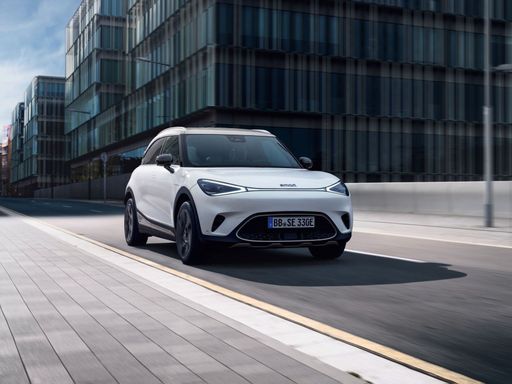 @ Smart Deutschland
@ Smart Deutschland
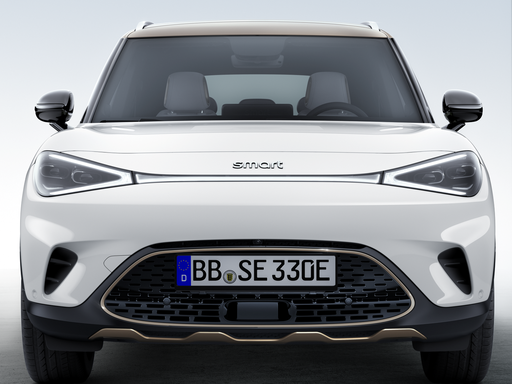 @ Smart Deutschland
@ Smart Deutschland
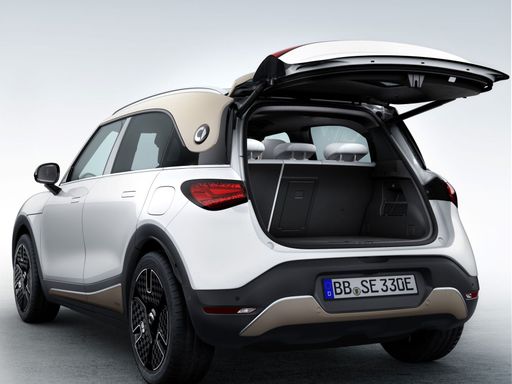 @ Smart Deutschland
@ Smart Deutschland
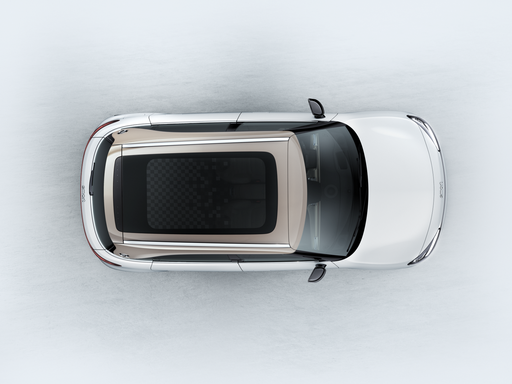 @ Smart Deutschland
@ Smart Deutschland
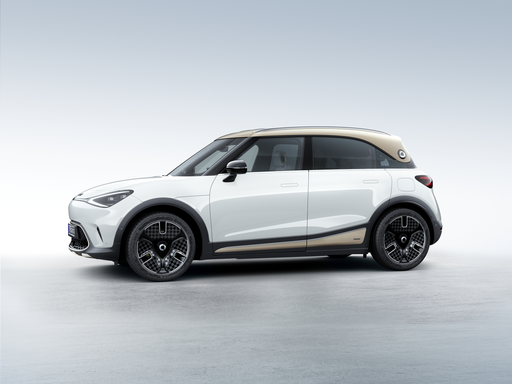 @ Smart Deutschland
@ Smart Deutschland
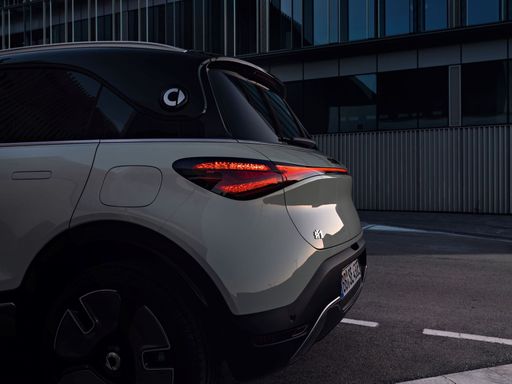 @ Smart Deutschland
@ Smart Deutschland
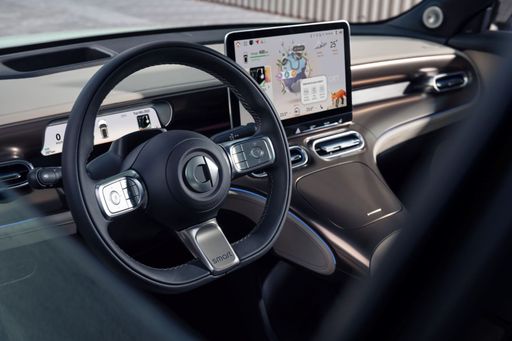 @ Smart Deutschland
@ Smart Deutschland
Hyundai Kona
The Hyundai Kona blends a bold design with a versatile interior, making it a standout choice in the compact SUV market. Its crisp handling and responsive steering provide an engaging driving experience, whether in the city or on the open road. The vehicle also offers a range of features designed to enhance comfort and connectivity, ensuring a pleasurable journey for both driver and passengers.
details @ hyundai.news
@ hyundai.news
 @ hyundai.news
@ hyundai.news
 @ hyundai.news
@ hyundai.news
 @ hyundai.news
@ hyundai.news

|

|
|
|
|
Costs and Consumption |
|
|---|---|
|
Price
31700 - 45000 £
|
Price
23100 - 41600 £
|
|
Consumption L/100km
-
|
Consumption L/100km
4.5 - 6.9 L
|
|
Consumption kWh/100km
16.8 - 18.2 kWh
|
Consumption kWh/100km
14.6 - 16.8 kWh
|
|
Electric Range
310 - 440 km
|
Electric Range
377 - 514 km
|
|
Battery Capacity
47 - 62 kWh
|
Battery Capacity
1.3 - 65.4 kWh
|
|
co2
0 g/km
|
co2
0 - 157 g/km
|
|
Fuel tank capacity
-
|
Fuel tank capacity
38 - 47 L
|
Dimensions and Body |
|
|---|---|
|
Body Type
SUV
|
Body Type
SUV
|
|
Seats
5
|
Seats
5
|
|
Doors
5
|
Doors
5
|
|
Curb weight
1780 - 1900 kg
|
Curb weight
1370 - 1773 kg
|
|
Trunk capacity
313 - 323 L
|
Trunk capacity
466 L
|
|
Length
4270 - 4300 mm
|
Length
4350 - 4385 mm
|
|
Width
1822 mm
|
Width
1825 mm
|
|
Height
1636 mm
|
Height
1580 - 1585 mm
|
|
Payload
425 - 470 kg
|
Payload
420 - 490 kg
|
Engine and Performance |
|
|---|---|
|
Engine Type
Electric
|
Engine Type
Petrol, Full Hybrid, Electric
|
|
Transmission
Automatic
|
Transmission
Manuel, Automatic
|
|
Transmission Detail
Reduction Gearbox
|
Transmission Detail
Schaltgetriebe, Automat. Schaltgetriebe (Doppelkupplung)
|
|
Drive Type
Rear-Wheel Drive, All-Wheel Drive
|
Drive Type
Front-Wheel Drive, All-Wheel Drive
|
|
Power HP
272 - 428 HP
|
Power HP
100 - 218 HP
|
|
Acceleration 0-100km/h
3.9 - 6.7 s
|
Acceleration 0-100km/h
7.8 - 13.3 s
|
|
Max Speed
180 km/h
|
Max Speed
162 - 208 km/h
|
|
Torque
343 - 584 Nm
|
Torque
200 - 265 Nm
|
|
Number of Cylinders
-
|
Number of Cylinders
3 - 4
|
|
Power kW
200 - 315 kW
|
Power kW
74 - 160 kW
|
|
Engine capacity
-
|
Engine capacity
998 - 1598 cm3
|
General |
|
|---|---|
|
Model Year
2023 - 2024
|
Model Year
2024
|
|
CO2 Efficiency Class
A
|
CO2 Efficiency Class
D, C, E, F, A
|
|
Brand
smart
|
Brand
Hyundai
|
smart #1
The New Era of Urban Mobility
The smart #1 emerges as a beacon of innovation and efficiency in the realm of electric vehicles. Positioned as an SUV, it seamlessly blends compact dimensions with the spaciousness and practicality that city drivers crave. Whether you're navigating bustling streets or planning longer journeys, the smart #1 is designed to cater to modern urban lifestyles.
Impressive Range and Efficiency
At the heart of the smart #1 lies its impressive range, with electric capabilities extending between 310 and 440 km, depending on the model. The efficiency of the vehicle is underscored by its electric consumption, which spans from 16.8 to 18.2 kWh/100 km. This ensures that drivers can enjoy longer trips without worrying about frequent recharges, all while maintaining an eco-friendly footprint.
Powerful Performance
The smart #1 offers a powerful driving experience, with options ranging from a rear-wheel drive boasting 272 PS to an all-wheel-drive variant pushing an exhilarating 428 PS. Acceleration is a highlight, with the most powerful model achieving 0-100 km/h in just 3.9 seconds. This performance is complemented by a smooth and responsive automatic transmission, ensuring a pleasurable driving experience.
Luxury Meets Sustainability
With seating for five, the smart #1 caters to families and urban adventurers alike. Its interior design emphasises luxury and sustainability, offering a premium feel with environmentally conscious materials. Whether you choose the Pro, Pure, or the sporty Brabus edition, each trim level provides a unique blend of features designed to enhance both comfort and driving pleasure.
Advanced Technology
Innovation is at the forefront of the smart #1, with advanced technology integrated into every aspect of the vehicle. The model year 2023 - 2024 line-up includes the latest in battery technology, featuring capacities from 47 to 62 kWh. Each version ensures optimum performance and reliability, keeping the driver connected and informed through intuitive in-car systems.
Uncompromised Safety
Safety and efficiency are paramount, as demonstrated by the smart #1's commitment to a CO2 efficiency class of A with zero emissions (0 g/km CO2), making it a leader in sustainable urban transport. Its lightweight design, weighing between 1780 and 1900 kg, and robust safety features ensure each journey is as secure as it is efficient.
Conclusion
The smart #1 represents a sophisticated blend of performance, sustainability, and technological innovation. As it stands at the cutting edge of electric vehicle technology, it redefines what drivers can expect from a modern SUV—merging style, functionality, and eco-conscious engineering into one exceptional package.
Hyundai Kona
The Hyundai Kona: A Comprehensive Overview
The Hyundai Kona has established itself as a standout in the compact SUV segment, blending innovation with performance and style. As the automotive world moves towards more sustainable and efficient options, the Kona offers a variety of powertrains, from traditional petrol engines to full hybrids and all-electric models.
Powertrain Options and Performance
The Hyundai Kona's powertrain choices cater to a wide range of preferences. For petrol enthusiasts, the Kona offers a 1.0L T-GDI engine, delivering 100 PS, and a more robust 1.6L T-GDI variant with up to 170 PS. Those looking for efficiency without sacrificing power can consider the full hybrid model, offering 129 PS and an impressive consumption of 4.5 L/100km.
For a greener option, the all-electric Kona provides a compelling case. With battery capacities of up to 65.4 kWh, the electric Kona offers power outputs of 156 to 218 PS, and efficiencies as low as 14.6 kWh/100km, enabling an electric range of up to 513 km.
Technical Specifications and Innovations
Built on a robust platform, the Kona delivers versatility and reliability. With a choice between manual or dual-clutch automatic gearboxes, along with options for front-wheel or all-wheel drive, the Kona ensures a tailored driving experience. The handling is enhanced by the car's lightweight construction, balancing a 1370 to 1773 kg curb weight with dynamic performance.
The Kona's design doesn't compromise cargo space for style; it offers a generous 466 L boot capacity. With a relatively compact body, measuring 4350 to 4385 mm in length, the Kona easily navigates urban environments while still commanding a strong road presence with its 1825 mm width.
Efficiency and Eco-Friendliness
Hyundai is committed to reducing emissions, as evidenced by the Kona's CO2 efficiency ratings, which range from class A for electric models to class D for some higher-performance petrol variants. The focus on reducing environmental impact without sacrificing driving pleasure is notable throughout the Kona range.
Costing and Value
The Hyundai Kona offers commendable value for money. Pricing starts at €26,400 and reaches up to €50,690, depending on the chosen configuration. The monthly running costs range from €956 to €1090, with a cost per kilometre of 38.3 to 43.6 cents, making it a competitive option in its class.
Conclusion: Modern, Efficient, and Versatile
The Hyundai Kona stands as a testament to Hyundai's commitment to innovation, efficiency, and practicality. Whether you are inclined towards a traditional combustion engine, a hybrid for a balance of power and efficiency, or a full electric model for maximum eco-friendliness, the Kona provides a tailored solution for each unique driver preference.
The prices and data displayed are estimates based on German list prices and may vary by country. This information is not legally binding.
